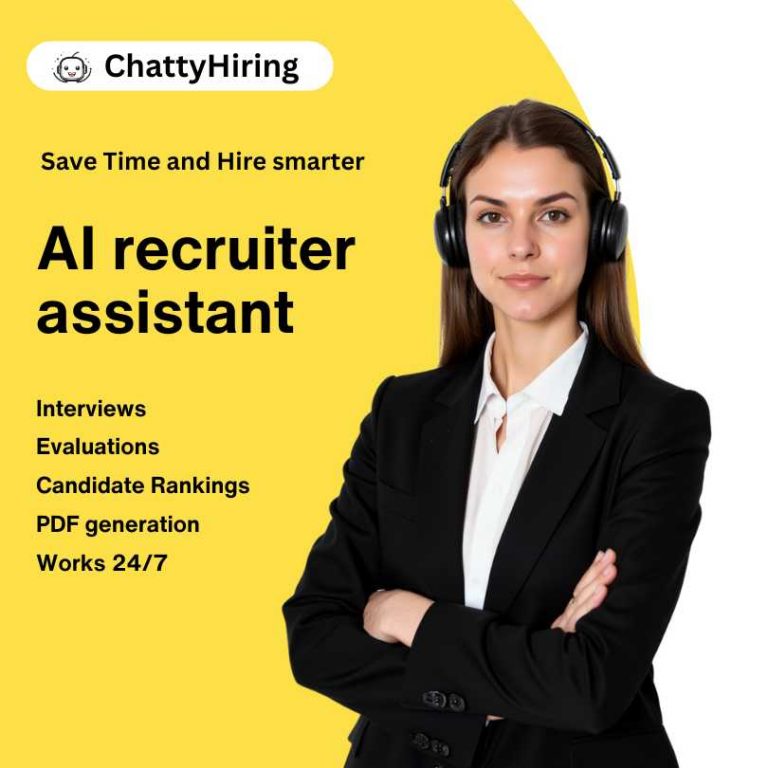In today’s fast-paced job market, the efficiency of the hiring process is paramount. Automated interviews offer a myriad of benefits that can significantly enhance your recruitment strategy. One of the most notable advantages is the time savings they provide.
By automating the initial stages of the interview process, you can quickly sift through a large pool of candidates, allowing you to focus your attention on those who are most qualified. This not only streamlines your workflow but also reduces the time-to-hire, which is crucial in attracting top talent before they are snatched up by competitors. Moreover, automated interviews can improve the candidate experience.
In a world where job seekers often juggle multiple applications, providing a flexible and user-friendly interview process can set your organization apart. Candidates appreciate the convenience of being able to complete interviews at their own pace and on their own schedule. This flexibility can lead to a more positive perception of your company, enhancing your employer brand and making it more appealing to prospective employees.
Additionally, automated interviews can help eliminate scheduling conflicts that often arise in traditional interview settings, further improving the overall experience for candidates.
Key Takeaways
- Automated interviews save time and resources by efficiently screening candidates and providing consistent evaluations.
- Automated interviews use pre-recorded questions and AI technology to assess candidates’ responses and provide data-driven insights.
- When choosing an automated interview platform, consider factors such as customization options, integration with existing systems, and candidate experience.
- Integrating automated interviews into the hiring process requires clear communication with candidates, training for hiring managers, and alignment with company values.
- To ensure fairness and objectivity in automated interviews, use standardized questions, diverse interview panels, and regular audits of the technology for bias.
How Automated Interviews Work
Automated interviews typically utilize advanced technology, such as artificial intelligence and machine learning, to facilitate the interview process. When you implement an automated interview system, candidates are usually presented with a series of pre-recorded questions or prompts that they respond to via video or audio recordings. This format allows you to assess their responses without the need for real-time interaction, making it easier to evaluate a larger number of candidates simultaneously.
The technology behind automated interviews often includes algorithms that analyze candidates’ responses for specific keywords, tone, and even facial expressions. This data-driven approach enables you to gain insights into a candidate’s personality traits and communication skills, which are essential factors in determining their fit for your organization. Furthermore, many platforms offer customizable question sets tailored to your specific job requirements, ensuring that you gather relevant information that aligns with your hiring criteria.
Choosing the Right Automated Interview Platform

Selecting the right automated interview platform is crucial for maximizing the benefits of this innovative approach. With numerous options available on the market, it’s essential to consider several factors before making a decision. First and foremost, evaluate the platform’s user interface and ease of use for both candidates and hiring managers.
A user-friendly design will encourage candidates to engage with the process and ensure that hiring managers can navigate the system efficiently. Additionally, consider the features offered by each platform. Look for tools that allow for customization of questions, integration with your existing applicant tracking system (ATS), and robust analytics capabilities.
These features will enable you to tailor the interview process to your specific needs while also providing valuable insights into candidate performance. Finally, don’t overlook customer support and training resources; having access to responsive support can make a significant difference in your experience with the platform.
Integrating Automated Interviews into the Hiring Process
| Metrics | Results |
|---|---|
| Time Saved | 30% |
| Candidate Satisfaction | 85% |
| Interview Completion Rate | 95% |
| Quality of Hire | Improved |
Integrating automated interviews into your hiring process requires careful planning and execution. Start by identifying which stages of your recruitment process would benefit most from automation. For instance, using automated interviews for initial screenings can help you filter out unqualified candidates before moving on to more in-depth assessments.
This strategic approach allows you to allocate your time and resources more effectively. Once you’ve determined where automated interviews fit into your process, communicate these changes clearly to your team and candidates. Transparency is key; ensure that everyone involved understands how the new system works and what to expect.
Providing training for hiring managers on how to interpret automated interview results will also be essential for making informed decisions based on candidate performance. By taking these steps, you can create a seamless transition that enhances your overall hiring strategy.
Ensuring Fairness and Objectivity in Automated Interviews
One of the primary concerns surrounding automated interviews is the potential for bias in the evaluation process. To ensure fairness and objectivity, it’s vital to establish clear criteria for assessing candidates’ responses. This involves defining what constitutes a successful answer for each question and using standardized scoring rubrics to evaluate responses consistently across all candidates.
Moreover, regularly reviewing and updating your question sets is essential to eliminate any unintentional biases that may arise over time. Engaging diverse teams in the development of interview questions can also help mitigate bias and ensure that your automated interview process is inclusive. By prioritizing fairness and objectivity, you can foster a more equitable hiring environment that attracts a diverse range of candidates.
Training Hiring Managers on Automated Interviewing

Training hiring managers on how to effectively use automated interviewing tools is crucial for maximizing their potential benefits. Begin by providing comprehensive training sessions that cover not only how to navigate the platform but also how to interpret the data generated from candidate responses. This knowledge will empower hiring managers to make informed decisions based on objective criteria rather than relying solely on intuition.
Additionally, encourage hiring managers to share their experiences and insights with one another. Creating a collaborative environment where they can discuss best practices and challenges will foster continuous improvement in your automated interviewing process. By investing in training and development for your hiring team, you can ensure that they are well-equipped to leverage this technology effectively.
Measuring the Success of Automated Interviews
To determine the effectiveness of your automated interview process, it’s essential to establish key performance indicators (KPIs) that align with your hiring goals. Metrics such as time-to-hire, candidate satisfaction scores, and quality of hire can provide valuable insights into how well your automated interviews are performing. Regularly analyzing these metrics will help you identify areas for improvement and make data-driven decisions about your recruitment strategy.
Furthermore, consider gathering feedback from both candidates and hiring managers regarding their experiences with automated interviews. This qualitative data can complement your quantitative metrics and provide a more comprehensive understanding of how well the process is working. By continuously measuring success and seeking feedback, you can refine your approach and ensure that automated interviews remain an effective tool in your hiring arsenal.
Addressing Common Concerns and Misconceptions about Automated Interviews
As with any innovative technology, there are common concerns and misconceptions surrounding automated interviews that need to be addressed. One prevalent worry is that automation may lead to a lack of personal connection between candidates and hiring managers. While it’s true that automated interviews remove some elements of human interaction, they can actually enhance the overall experience by allowing for more focused conversations during later stages of the hiring process.
Another misconception is that automated interviews are impersonal or overly rigid. In reality, many platforms offer customizable question sets that allow you to tailor the interview experience to reflect your company culture and values. By carefully crafting questions that resonate with your organization’s mission, you can create an engaging experience for candidates while still benefiting from the efficiency of automation.
In conclusion, embracing automated interviews can revolutionize your hiring process by saving time, improving candidate experiences, and providing valuable insights into potential hires. By understanding how these systems work, choosing the right platform, integrating them effectively into your recruitment strategy, ensuring fairness, training your team, measuring success, and addressing concerns, you can harness the full potential of this innovative approach to recruitment.
Automated interviews have been revolutionizing the recruitment process by boosting hiring speed and efficiency. According to a related article on chattyhiring.com, AI-driven software is playing a crucial role in streamlining the hiring process and helping companies find the right candidates quickly. This technology is not only saving time for recruitment teams but also improving the overall productivity in the hiring process. Additionally, AI candidate assessment tools mentioned in another article on chattyhiring.com are helping recruiters make more informed decisions when evaluating potential candidates.
FAQs
What are automated interviews?
Automated interviews are a technology-driven approach to conducting job interviews using artificial intelligence and machine learning algorithms. These interviews are typically conducted online and involve the use of pre-recorded questions and automated candidate responses.
How do automated interviews work?
Automated interviews typically involve the use of a digital platform that allows employers to create a set of pre-recorded interview questions. Candidates then log in to the platform and record their responses to these questions using their computer or smartphone. The platform uses AI and machine learning algorithms to analyze the candidate’s responses and provide feedback to the employer.
What are the benefits of automated interviews?
Automated interviews offer several benefits, including time and cost savings for both employers and candidates. They also provide a standardized and consistent interview experience for all candidates, and can help to reduce bias in the hiring process. Additionally, automated interviews can help employers to efficiently screen a large number of candidates and identify the most qualified individuals for further consideration.
What are the potential drawbacks of automated interviews?
Some potential drawbacks of automated interviews include the lack of personal interaction between the candidate and the interviewer, which can make it difficult to assess soft skills and cultural fit. Additionally, candidates may find the experience impersonal and less engaging than a traditional face-to-face interview. There are also concerns about the potential for bias in the algorithms used to analyze candidate responses.
Are automated interviews becoming more common?
Yes, automated interviews are becoming increasingly common as more employers seek to streamline their hiring processes and leverage technology to improve efficiency. Many companies are adopting automated interview platforms as part of their recruitment strategy, particularly for high-volume hiring or initial screening of candidates.
-

A passionate advocate for the future of HR innovation. With expertise in leveraging AI to revolutionize recruitment processes, Carlos has a clear vision: empower HR teams while creating meaningful candidate experiences.
View all posts





